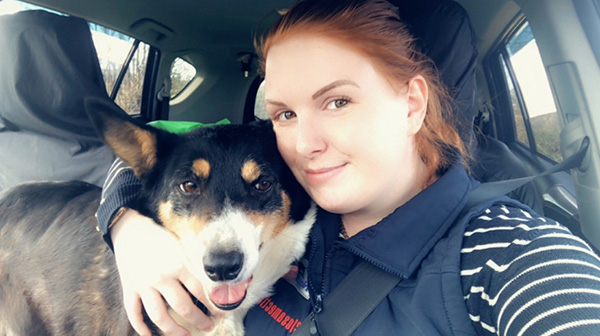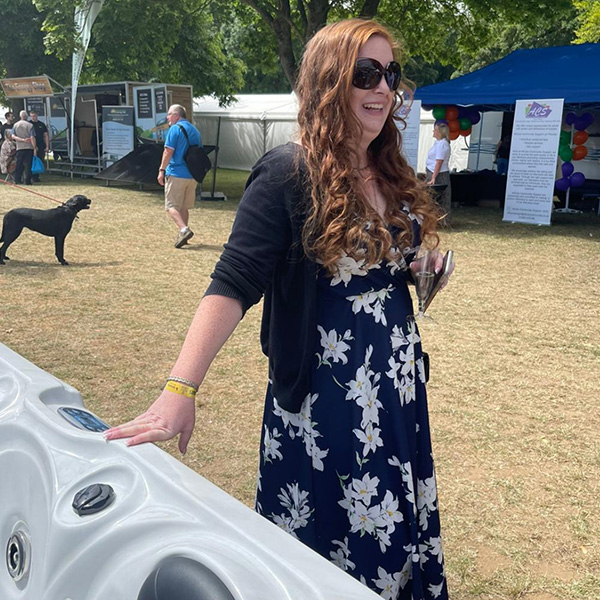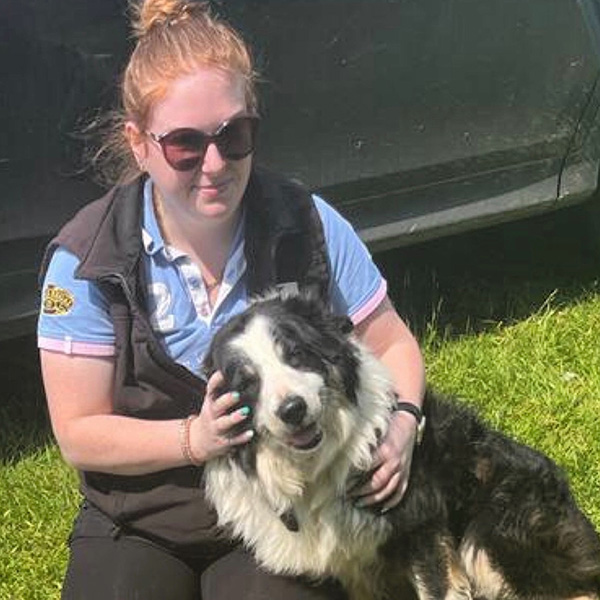Georgina’s story
“I feel like I’m finally getting my life back.”

Georgina, Enterra® Therapy patient
Soon after a February 2019 surgery to address severe acid reflux, Georgina started feeling strange symptoms: constant nausea, extreme pain and bloating, and fullness after a few bites of food.
Knowing in her gut that something was very wrong, she tried for years to get her doctors to listen.
Today, after finding a diagnosis—and relief from her symptoms—Georgina shares her story about life with gastroparesis.
Start of symptoms
After my acid reflux surgery, when my symptoms started really bothering me, I went back to my general practitioner (GP) saying that I felt quite off. But they just kept saying, “Oh, it’s just a stomach bug,” or “It must be IBS or something you ate—it’ll get better soon.”
By May 2020, though, I knew something really was wrong. I was so unable to eat that, in addition to my other symptoms, I ended up with a vitamin B12 deficiency, an iron deficiency, and stomach infections.
Journey to diagnosis
For over a year, I got passed from doctor to doctor, including a gastroenterologist at an NHS hospital. One of his theories was that I may have had a peptic ulcer, so he ordered an endoscopy, and even though there was food in my stomach when there shouldn’t have been, he never mentioned anything about gastroparesis.
At one point I got referred to someone in London who just tried to sell me a device you put on your ear for £700.
Meanwhile, I was having days and days on end of nausea and pain and exhaustion that just did not let off. After so many doctors making out that it was all in my head, I finally said to myself, “I need to see someone who actually wants to help me.”
So I did some research and came across a specialist and asked my GP to refer me. When I went to see him, I took all of my medical notes with me—every letter and record of other gastroenterologists saying that I had acid reflux or indigestion or depression.
He sat and read through it all, and when he finished, he just looked at me and said, “I think you’ve got gastroparesis.” It was so relieving.
My professional background is in nursing and social care. So prior to seeing him, I had done as much research as I could, and had come across gastroparesis. But because it’s such a rare condition and because no other doctors believed me, I didn’t know that it was actually the answer. But this doctor listened to me, straight away.
So finally, in September 2020, I had a gastric emptying study (GES), and the results confirmed that I had gastroparesis.

Discovering Enterra® Therapy
After being diagnosed, my new gastroenterologist and I were able to discuss treatment options.
I told him about all the medications that I had tried, and how none of them had helped. And even if they had been effective, I have an irregular heartbeat, which meant that I wouldn’t be able to stay on them long-term. So we had to look at alternative routes.
At first we tried an NJ tube, but I just could not tolerate it. It cut up the inside of my nose and it was just a horrible experience. He asked me whether I had heard about gastric electrical stimulation through a device called Enterra Therapy. And I actually had, back when I was doing my own research, prior to being diagnosed. We talked about it, and he said, “Let’s go for it. Let’s do the stimulator.”
Unfortunately, because of Covid, I had to wait for over a year to actually receive my stimulator. That was really challenging. It was horrible, just waiting. But eventually, in early 2022, I was able to get a spot at a surgery centre in London and receive my Enterra Therapy System.
Adjusting to life with Enterra Therapy
I’ll be honest, the process of recovery wasn’t easy for me, because I do have other health conditions.
I’ve heard of other people feeling relief instantly, but for me it took around six months to really feel it working. For those first six months, I went once a month to have it adjusted until I finally felt a massive improvement.
And it did feel a bit weird initially. But now, I hardly notice it, and it’s totally changed my life. It was 100% worth it, because within a few months I really could notice the massive amount of difference it’s made.


Living with Enterra Therapy
At the beginning I didn’t really have a clue what was going on or how to manage my symptoms, but since having the stimulator, it’s changed my life.
I can eat most things now. I still have nausea daily, but most of the time it’s in the background or I don’t even notice it.
I think it’s important for people to understand that Enterra Therapy is not a cure, because there is no cure for gastroparesis. But it is there to aid you—to help you with your nausea and vomiting.
Like most people living with gastroparesis, I still experience flare-ups if I’m stressed, or if I eat something that I shouldn’t. But in general I’ve managed to figure out which foods I can or can’t tolerate.
A big part of living with the Enterra System is learning to recognise if you need an adjustment to the level of stimulation. For a while after surgery, I went in about every 3 months—sometimes more often, sometimes less so. But after having my system adjusted, I’ve actually been able to feel my nausea level coming down on the drive home from the doctor. As of May 2024, I’m pleased to say that I’ve gone 5 months without needing an adjustment, which feels fantastic.
It really was a struggle before, getting the right care or even getting my doctors to believe me. Trying to actually get that diagnosis or to be referred to someone who actually wanted to help, or even just listen to me, was incredibly hard. Nobody believed what I was saying. They all just fobbed me off and said, “She’s got anxiety or depression, or she’s just stressed out, that’s why she’s feeling sick.”
But the team I’ve got now—they go above and beyond. They can’t do enough to help me.
My gastroparesis is never going to go away, but it’s so different now. And if you’d have told me, 2 or 3 years ago, that I’d be able to eat most things and do most things, I’d have laughed at you—I couldn’t even leave the house. But now, I feel like I’m finally getting my life back.

Georgina’s experience is unique to her and individual results may vary.
MKT-D-00605, Rev B
IMPORTANT SAFETY INFORMATION
The Enterra® Therapy System for gastric electrical stimulation (GES) is indicated for the treatment of chronic intractable (drug refractory) nausea and vomiting secondary to gastroparesis. This system has not been evaluated for pregnant women, for use in patients under the age of 18, or patients over the age of 70. Patients should always discuss potential risks and benefits with their clinician.
